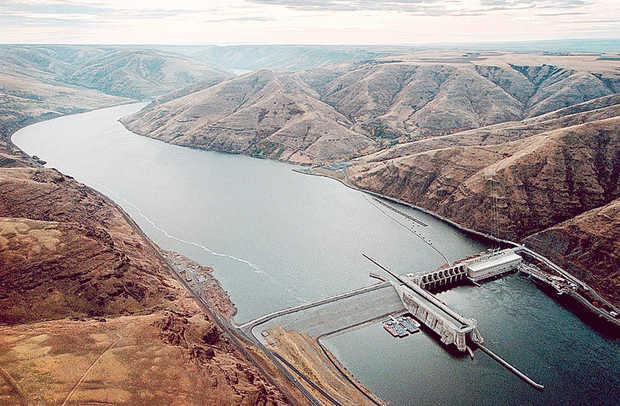forum
library
tutorial
contact

For Salmon, a Crucial
Moment of Decision
by Rocky Barker
High Country News, June 13, 2005
|
the film forum library tutorial contact |

|
For Salmon, a Crucial
by Rocky Barker
|
Ruling could set in motion dramatic changes on Northwest rivers
 U.S. District Judge James Redden has thrown out the Bush administration's salmon protection plan, setting the stage for dramatic changes to the federal hydropower system.
U.S. District Judge James Redden has thrown out the Bush administration's salmon protection plan, setting the stage for dramatic changes to the federal hydropower system.
Siding with environmental groups, Indian tribes, fishermen and the state of Oregon, the Portland judge ruled in late May that the administration erred when it said that eight dams on the Columbia and Snake rivers do not jeopardize endangered and threatened salmon and steelhead. Redden also rejected the administration's view that the Endangered Species Act requires the federal government to keep salmon numbers stable, but not recover them (HCN, 10/11/04: Dams will stand, salmon be damned).
This is the fourth "biological opinion" since various runs of salmon and steelhead were first put on the endangered species list in the early 1990s. Shortly after coming into office, President Bush threw out a Clinton administration plan that left open the possibility of breaching the four dams on the Lower Snake River if other recovery measures failed. The 2004 Bush plan said the dams did not jeopardize ocean-going fish. It formally removed dam-breaching as an option, despite the fact that most fisheries biologists say breaching the dams is the best and perhaps only way to recover viable salmon populations.
Redden said the Endangered Species Act requires the government to do whatever is necessary to protect endangered species. Under the Bush interpretation, a federal agency "would be able to exempt itself from accountability by characterizing some, even lethal, elements of any proposed action as 'nondiscretionary,' " Redden wrote.
Bush administration officials were disappointed with the decision and defended their salmon recovery measures. "Our efforts to protect salmon are yielding measurable improvements, and we are hard at work on recovery plans," says Bob Lohn, Northwest regional director of National Oceanic and Atmospheric Administration Fisheries.
Redden will hold a June 10 hearing to determine whether he should put in place an interim salmon protection plan. Such a plan could increase restrictions on hydroelectric dam operations that allow barges to travel inland as far as the grain-shipping hub of Lewiston, Idaho. It could also lower reservoirs that irrigate millions of acres of farms, releasing that water to help salmon reach the ocean.
Steve Wright, administrator of the Bonneville Power Administration, warns that if Redden accepts salmon advocates' recommendations, it would increase the cost of hydropower by more than $100 million this summer. Redden is in the same position as another federal judge, William Dwyer of Seattle, who in 1989 issued a temporary restraining order stopping all old-growth timber sales on national forests in Oregon and Washington to protect the northern spotted owl. Dwyer's 1989 decision and a subsequent decision in 1991 triggered a transformation in forest management. Eventually, timber harvest on the Northwest's national forests was reduced from 9 billion board-feet per year to less than 1 billion. Timber mills had to retool to handle smaller logs, move operations to private lands, or shut their doors altogether (HCN, 9/27/04: Life After Old Growth).
Dwyer's decision, which political leaders at the time described as a "train wreck" for the Pacific Northwest's economy, catapulted the owl and the ancient forests into the national spotlight. In an effort to increase the timber harvest, President George H. W. Bush created a special committee of presidential appointees with the power to sidestep the Endangered Species Act. But the so-called "God squad" proved unpopular, and had no effect.
Redden's recent ruling puts salmon at a similar crossroads, says Bill Arthur, a veteran environmentalist and a regional representative of the Sierra Club. "I've been waiting 15 years for this fork in the road," says Arthur, who helped stop the old-growth logging and was one of the winning plaintiffs in Redden's court.
The Bonneville Power Administration sells power from the federal dams to regional utilities and industries at the cost of generation, which is below market cost. Arthur believes that, like old-growth logging, the Northwest's special power deal will crumble under national scrutiny, especially if it's causing salmon to become extinct.
Redden's decision comes as salmon returns have dropped off sharply this spring for still-unknown reasons, after four years of dramatically improved runs. "It is apparent that the listed species are in serious decline and not evidencing signs of recovery," the judge wrote.
It also comes at a time when debate is heating up in Congress over rewriting the Endangered Species Act. It is sure to provide ammunition both for reformers, who say the act is too strict, and for defenders, who argue that it is the last line of defense for imperiled wildlife.
learn more on topics covered in the film
see the video
read the script
learn the songs
discussion forum
